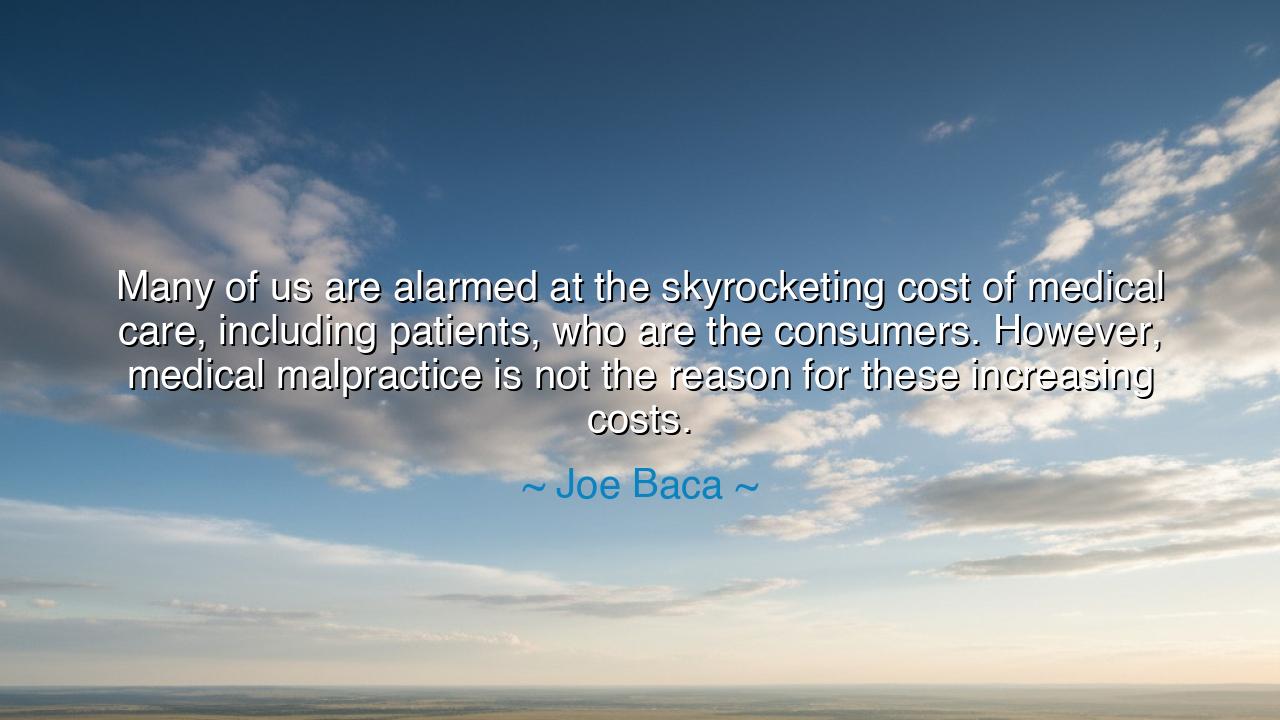
Many of us are alarmed at the skyrocketing cost of medical care
Many of us are alarmed at the skyrocketing cost of medical care, including patients, who are the consumers. However, medical malpractice is not the reason for these increasing costs.






In the thoughtful and resolute words of Joe Baca, there resounds both compassion and discernment: “Many of us are alarmed at the skyrocketing cost of medical care, including patients, who are the consumers. However, medical malpractice is not the reason for these increasing costs.” These words, though modern in subject, echo the timeless virtue of clarity amid confusion. They remind us that in every age, humanity struggles not only against hardship, but against misunderstanding — that to solve a problem, one must first see it truthfully. Beneath this statement lies a deeper message about justice, balance, and responsibility: that the pursuit of truth requires patience, wisdom, and the courage to look beyond easy blame.
The meaning of this quote lies in the distinction between perception and reality. In the face of rising medical costs, many have sought to find a single cause — something, or someone, to hold accountable. It is a natural instinct of humankind to seek order within chaos, to assign fault when faced with suffering. Yet Baca, with calm reason, points us toward a more measured understanding: the rising costs of healthcare are a complex web of forces — technological advancement, administrative inefficiency, pharmaceutical monopolies, and systemic waste — not merely the fault of medical malpractice, which, though real, is but one thread in a vast tapestry. His words call for wisdom over accusation, truth over simplification.
The origin of these words comes from Baca’s work as a legislator and advocate for working families. As a member of the United States Congress, he witnessed firsthand the burdens borne by ordinary citizens struggling to afford care — families bankrupted by illness, workers forced to choose between health and livelihood. In the public discourse, many voices rose to accuse malpractice lawsuits and legal settlements as the root of the problem. But Baca, informed by study and conscience, stood against this convenient half-truth. His statement is not merely political; it is moral. It is a defense of justice itself — for to falsely accuse is to wound the innocent, and to ignore the deeper causes is to let the real disease grow unchecked.
Throughout history, societies have faced similar moments of misplaced blame. The ancients tell of Athens, once struck by plague and turmoil, whose people turned their anger upon their leaders and healers. In their desperation, they sought scapegoats instead of solutions, punishing those who could not be blamed for the hand of fate. Only later did they learn that wisdom is found not in accusation but in understanding the system of causes. Baca’s words, though centuries apart, echo this ancient lesson: that it is far easier to cast stones than to study truth. The wise, however, seek the root, not the shadow — they ask not who is to blame, but how the harm may be healed.
The emotional heart of Baca’s statement lies in compassion for the patient — the one who suffers not from fault, but from circumstance. He speaks not as one detached from the struggle, but as one who feels the weight of every family forced to choose between medicine and rent, every elder whose savings are drained by necessity. His recognition that “patients are the consumers” reminds us of a profound moral reality: that healthcare, in its essence, is not a marketplace but a covenant. When care becomes commerce, when healing becomes profit, something sacred is lost. His words thus call upon the human conscience — upon lawmakers, physicians, and citizens alike — to restore balance to a system meant to serve, not exploit.
Consider the story of Florence Nightingale, who in the 19th century walked into the chaos of war-torn hospitals where disease and death were blamed on chance or fate. Instead of condemning others, she studied the causes — hygiene, nutrition, and overcrowding — and transformed the field of medicine forever. Like Baca, she taught that the path to healing lies not in blame but in understanding, reform, and compassion. Both voices, separated by centuries, sing the same refrain: that the health of a people is not preserved through accusation, but through wisdom guided by care.
The lesson we draw from Baca’s words is clear and enduring: seek truth beyond appearances, and do not allow anger to blind you to complexity. When faced with hardship, resist the temptation of simple answers. Ask questions. Investigate causes. Demand accountability, yes — but demand it rightly, from the true sources of imbalance. The wise do not wage war against symptoms; they cure the disease at its root. And the just, in all ages, know that blame without knowledge is a wound that deepens rather than heals.
So let the teaching of Joe Baca endure as both warning and guide: that to reform society, one must first understand it. The rising cost of care is not a storm born of one cloud, but of many winds. To calm it requires patience, wisdom, and unity. Let us therefore act not in anger but in knowledge, not in vengeance but in vision. For in truth — as in medicine — only those who seek to understand can hope to heal.






AAdministratorAdministrator
Welcome, honored guests. Please leave a comment, we will respond soon